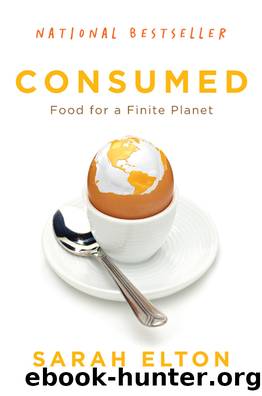Consumed by Sarah Elton

Author:Sarah Elton [Elton, Sarah]
Language: eng
Format: epub
ISBN: 9781443406697
Publisher: HarperCollins Canada
Published: 2013-07-14T16:00:00+00:00
Unfortunately, preserving agricultural biodiversity alone isn’t enough to provide us with the seeds we will need to feed the world in 2050. That’s because the way seeds are developed, bought, and sold needs to be overhauled. Seeds today are big business. Over the last forty years, large transnational firms have taken over the global seed industry from small family-owned companies. The market they’ve captured is worth more than $36 billion a year. Hybrids must be purchased year after year to achieve their advertised results, making them a profitable commodity. Up until the 1980s, these seeds were produced on the whole by small, often family-owned businesses, supported by research done by government extension programs. Then the large chemical and pharmaceutical firms began to buy up these small companies. Ownership in the seed industry consolidated through mergers and more acquisitions so quickly that by 2009, only a handful of companies dominated the global seed industry, distorting the market and limiting the choice in seeds: the US-based Monsanto (the largest seed company in the world), DuPont, and Dow; the Swiss-based Syngenta; and the German Bayer and BASF.
According to the FAO’s Second Report on the State of the World’s Plant Genetic Resources for Food and Agriculture, released in 2010, governments around the world have largely withdrawn from seed production and entrusted the field to the private sector. As a result, only seeds for the most profitable crops such as grains and hybrid vegetables designed for “market-oriented agriculture” are being propagated. According to the report, crops with less market opportunity, such as self-pollinated ones, are no longer being produced on a large scale. While many of the world’s farmers still save and replant their own seeds year after year, trading them with their neighbours to maintain vigour, this practice is on the decline, particularly in industrialized countries.34 In the 1960s in the United States, 63 percent of farmers saved their own soybean seed stock, whereas only 10 percent did so in 2008.
Today’s seed industry limits sustainable agriculture in three ways. Firstly, as the market consolidates and the smaller seed companies disappear, entire seed lines are lost. Between 1984 and 1987, almost a quarter of the mail-order seed companies in the United States and Canada went out of business or were bought by bigger players. Many of the open-pollinated heritage varieties that were propagated by these small companies were discontinued. For the global companies, heritage varieties are nowhere near as profitable as hybrids because people buy them once and save them from year to year. It’s also cheaper for a global seed company to breed one genetically uniform variety to service all markets rather than to maintain small seed lines adapted to a variety of regions. In 2000, the world’s largest vegetable seed company at the time, Seminis (now owned by Monsanto), discontinued two thousand varieties of fruits and vegetables as part of a “global restructuring and optimization plan.” The Seed Savers Exchange, based in Iowa, has tracked the disappearance of non-hybrid vegetable seeds in Canada and the United States with its Garden Seed Inventory.
Download
This site does not store any files on its server. We only index and link to content provided by other sites. Please contact the content providers to delete copyright contents if any and email us, we'll remove relevant links or contents immediately.
Life 3.0: Being Human in the Age of Artificial Intelligence by Tegmark Max(5558)
The Sports Rules Book by Human Kinetics(4387)
The Age of Surveillance Capitalism by Shoshana Zuboff(4292)
ACT Math For Dummies by Zegarelli Mark(4049)
Unlabel: Selling You Without Selling Out by Marc Ecko(3663)
Blood, Sweat, and Pixels by Jason Schreier(3624)
Hidden Persuasion: 33 psychological influence techniques in advertising by Marc Andrews & Matthijs van Leeuwen & Rick van Baaren(3565)
The Pixar Touch by David A. Price(3439)
Bad Pharma by Ben Goldacre(3428)
Urban Outlaw by Magnus Walker(3396)
Project Animal Farm: An Accidental Journey into the Secret World of Farming and the Truth About Our Food by Sonia Faruqi(3221)
Kitchen confidential by Anthony Bourdain(3090)
Brotopia by Emily Chang(3056)
Slugfest by Reed Tucker(3004)
The Content Trap by Bharat Anand(2927)
The Airbnb Story by Leigh Gallagher(2857)
Coffee for One by KJ Fallon(2636)
Smuggler's Cove: Exotic Cocktails, Rum, and the Cult of Tiki by Martin Cate & Rebecca Cate(2541)
Beer is proof God loves us by Charles W. Bamforth(2461)
